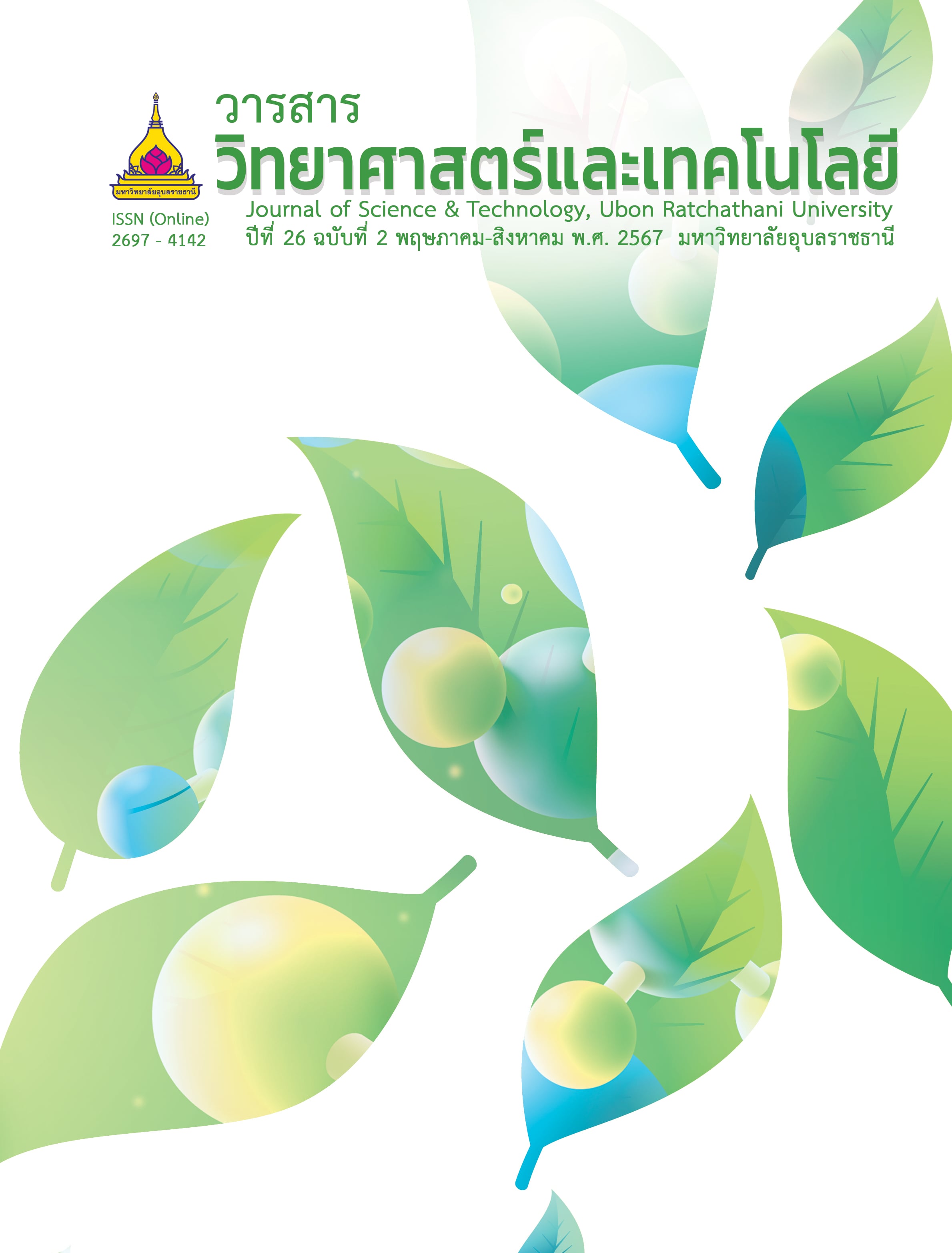ฤทธิ์ต้านมะเร็งของสารสกัดไผ่จืดต่อเซลล์มะเร็งลำไส้ใหญ่และทวารหนักชนิด HCT116
Main Article Content
บทคัดย่อ
ไผ่จืดเป็นพืชตระกูลหญ้าที่ทราบกันดีว่ามีสรรพคุณด้านการขับสารพิษ แต่มีการศึกษาเกี่ยวกับฤทธิ์ต้านมะเร็งน้อยมาก ดังนั้นงานวิจัยนี้จึงมีวัตถุประสงค์เพื่อทดสอบฤทธิ์ต้านมะเร็งของสารสกัดไผ่จืดต่อเซลล์มะเร็งลำไส้ใหญ่และทวารหนักของมนุษย์ชนิด HCT116 โดยในงานวิจัยนี้ได้ศึกษาผลของสารสกัดไผ่จืดต่อความมีชีวิตของเซลล์ HCT116 โดยวิธี MTT assay การเพิ่มจำนวนเซลล์ HCT116 โดยวิธี clonogenic assay การเคลื่อนที่ของเซลล์ HCT116 โดยวิธี wound healing assay และวัฏจักรเซลล์ของเซลล์ HCT116 โดยวิธี flow cytometry ผลการทดลองพบว่าสารสกัดไผ่จืดทำให้อัตราการรอดชีวิตของเซลล์ HCT116 ลดลงตามความเข้มข้นของสารสกัดไผ่จืด โดยค่าร้อยละความมีชีวิตของเซลล์ HCT116 เท่ากับ 81.92, 67.03 และ 63.27 เมื่อบ่มเซลล์ HCT116 กับสารสกัดไผ่จืดที่มีความเข้มข้น 1, 1.25 และ 1.5 มิลลิกรัมต่อมิลลิลิตรเป็นเวลา 48 ชั่วโมง ตามลำดับ นอกจากนี้ยังพบว่าสารสกัดไผ่จืดสามารถยับยั้งการเพิ่มจำนวนโคโลนี และลดการเคลื่อนที่ของเซลล์ HCT116 รวมทั้งชักนำให้เกิดการหยุดของวัฏจักรเซลล์ของเซลล์ HCT116 ที่ระยะ G0/G1 ได้ งานวิจัยนี้แสดงให้เห็นว่าสารสกัดไผ่จืดมีฤทธิ์ต้านมะเร็งต่อเซลล์มะเร็งลำไส้ใหญ่และทวารหนักชนิด HCT116 และน่าจะเป็นทางเลือกสำหรับการรักษาโรคมะเร็งได้
Article Details

อนุญาตภายใต้เงื่อนไข Creative Commons Attribution-NonCommercial-NoDerivatives 4.0 International License.
บทความที่ได้รับการตีพิมพ์เป็นลิขสิทธิ์ของ วารสารวิทยาศาสตร์และเทคโนโลยี มหาวิทยาลัยอุบลราชธานี
ข้อความที่ปรากฏในบทความแต่ละเรื่องในวารสารวิชาการเล่มนี้เป็นความคิดเห็นส่วนตัวของผู้เขียนแต่ละท่านไม่เกี่ยวข้องกับมหาวิทยาลัยอุบลราชธานี และคณาจารย์ท่านอื่นๆในมหาวิทยาลัยฯ แต่อย่างใด ความรับผิดชอบองค์ประกอบทั้งหมดของบทความแต่ละเรื่องเป็นของผู้เขียนแต่ละท่าน หากมีความผิดพลาดใดๆ ผู้เขียนแต่ละท่านจะรับผิดชอบบทความของตนเองแต่ผู้เดียว
เอกสารอ้างอิง
Hanahan, D. 2022. Hallmarks of cancer: New dimensions. Cancer Discovery. 12(1): 31-46.
Siegel, R.L. and et al. 2022. Cancer statistics, 2022. CA: A Cancer Journal for Clinicians. 72(1): 7-33.
Wang, S. and et al. 2019. Postoperative complications and prognosis after radical gastrectomy for gastric cancer: A systematic review and meta-analysis of observational studies. World Journal of Surgical Oncology. 17(1): 52.
Bhanot, A., Sharma, R. and Noolvi, M.N. 2011. Natural sources as potential anti-cancer agents: A review. International Journal of Phytomedicine. 3: 9-26.
Gordaliza, M. 2007. Natural products as leads to anticancer drugs. Clinical and Translational Oncology. 9(12): 767-776.
He, Q., Ma, P. and Torshizi, R. 2022. The impact of some natural phenolic compounds on α-glucosidase and sorbitol dehydrogenase enzymes, and anti-leukemia cancer potential, spin density distributions, and in silico studies. Journal of Oleo Science. 71(6): 863-873.
Ai, T. and et al. 2016. GDP-D-mannose pyro- phosphorylase from Pogonatherum paniceum enhances salinity and drought tolerance of transgenic tobacco. Zeitschrift fur Naturforschung C: A Journal of Biosciences. 71(7-8): 243-252.
Thongboontho, R. and et al. 2023. Effects of Pogonatherum paniceum (Lamk) Hack extract on anti-mitochondrial DNA mediated inflammation by attenuating Tlr9 expression in LPS-induced macrophages. Nutrition Research and Practice. 17(5): 827-843.
Petchsak, P. and Sripanidkulchai, B. 2015. Momordica cochinchinensis aril extract induced apoptosis in human MCF-7 breast cancer cells. Asian Pacific Journal of Cancer Prevention. 16(13): 5507-5513.
Zhang, X. and et al. 2019. Cannabidiol induces cell cycle arrest and cell apoptosis in human gastric cancer SGC-7901 cells. Biomolecules. 9(8): 302.
Alnuqaydan, A.M. and et al. 2022. Evaluation of the cytotoxic activity of Tamarix articulata and its anticancer potential in prostate cancer cells. Journal of Applied Pharmaceutical Science. 12(02): 89-108.
Rawangkan, A. and et al. 2022. Dinactin: A new antitumor antibiotic with cell cycle progression and cancer stemness inhibiting activities in lung cancer. Antibiotics. 11(12): 1845.
Praphasawat, R. and et al. 2023. Anticancer and antimutagenic properties of Pogonatherum paniceum on colorectal cancer cells. World Journal of Oncology. 14(4): 266-276.
Sp, N. and et al. 2020. Tannic acid inhibits non-small cell lung cancer (NSCLC) stemness by inducing G0/G1 cell cycle arrest and intrinsic apoptosis. Anticancer Research. 40(6): 3209-3220.
Kim, D.A. and et al. 2019. Tannic acid attenuates the formation of cancer stem cells by inhibiting NF-κB-mediated phenotype transition of breast cancer cells. American Journal of Cancer Research. 9(8): 1664-1681.
Chen, M.C. and et al. 2022. Tannic acid attenuate AKT phosphorylation to inhibit UMUC3 bladder cancer cell proliferation. Molecular and Cellular Biochemistry. 477(12): 2863-2869.
Wang, D. and Bao, B. 2020. Gallic acid impedes non-small cell lung cancer progression via suppression of EGFR-dependent CARM1-PELP1 complex. Drug Design, Development and Therapy. 14: 1583-1592.
Aye, K.T. and et al. 2021. Gallic acid enhances pirarubicin-induced anticancer in living K562 and K562/Dox leukemia cancer cells through cellular energetic state impairment and P-glycoprotein inhibition. Oncology Reports. 46(4): 227.
Turkoglu, B. and Mansuroglu, B. 2020. Catechin loaded poly (lactic-co-glycolic acid) nanoparticles: characterization, antioxidant and cytotoxic activity against MCF-7 breast cancer cells. Journal of Nanoscience and Nanotechnology. 20(9): 5313-5321.
McMillan, B. and et al. 2007. Dietary influence on pancreatic cancer growth by catechin and inositol hexaphosphate. Journal of Surgical Research. 141(1): 115-119.


